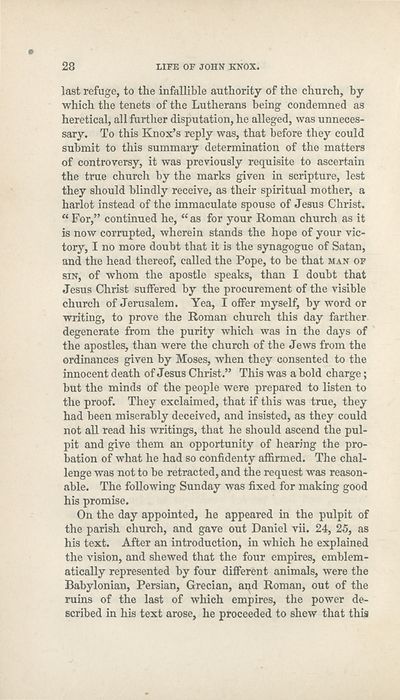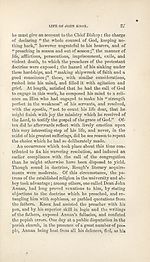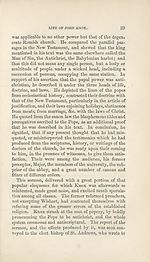Download files
Complete book:
Individual page:
Thumbnail gallery: Grid view | List view

28
LIFE OF JOHN KNOX.
last refuge, to the infallible authority of the church, by
which the tenets of the Lutherans being condemned as
heretical, all further disputation, he alleged, was unneces¬
sary. To this Knox’s reply was, that before they could
submit to this summary determination of the matters
of controversy, it was previously requisite to ascertain
the true church by the marks given in scripture, lest
they should blindly receive, as their spiritual mother, a
harlot instead of the immaculate spouse of Jesus Christ.
“ For,” continued he, “ as for your Roman church as it
is now corrupted, wherein stands the hope of your vic¬
tory, I no more doubt that it is the synagogue of Satan,
and the head thereof, called the Pope, to be that man of
sin, of whom the apostle speaks, than I doubt that
Jesus Christ suffered by the procurement of the visible
church of Jerusalem. Yea, I offer myself, by word or
writing, to prove the Roman church this day farther
degenerate from the purity which was in the days of
the apostles, than were the church of the Jews from the
ordinances given by Moses, when they consented to the
innocent death of Jesus Christ.” This was a bold charge;
but the minds of the people were prepared to listen to
the proof. They exclaimed, that if this was true, they
had been miserably deceived, and insisted, as they could
not all read his writings, that he should ascend the pul¬
pit and give them an opportunity of hearing the pro¬
bation of what he had so confidenty affirmed. The chal¬
lenge was not to be retracted, and the request was reason¬
able. The following Sunday was fixed for making good
his promise.
On the day appointed, he appeared in the pulpit of
the parish church, and gave out Daniel vii. 24, 25, as
his text. After an introduction, in which he explained
the vision, and shewed that the four empires, emblem¬
atically represented by four different animals, were the
Babylonian, Persian, Grecian, and Roman, out of the
ruins of the last of which empires, the power de¬
scribed in his text arose, he proceeded to shew that this
LIFE OF JOHN KNOX.
last refuge, to the infallible authority of the church, by
which the tenets of the Lutherans being condemned as
heretical, all further disputation, he alleged, was unneces¬
sary. To this Knox’s reply was, that before they could
submit to this summary determination of the matters
of controversy, it was previously requisite to ascertain
the true church by the marks given in scripture, lest
they should blindly receive, as their spiritual mother, a
harlot instead of the immaculate spouse of Jesus Christ.
“ For,” continued he, “ as for your Roman church as it
is now corrupted, wherein stands the hope of your vic¬
tory, I no more doubt that it is the synagogue of Satan,
and the head thereof, called the Pope, to be that man of
sin, of whom the apostle speaks, than I doubt that
Jesus Christ suffered by the procurement of the visible
church of Jerusalem. Yea, I offer myself, by word or
writing, to prove the Roman church this day farther
degenerate from the purity which was in the days of
the apostles, than were the church of the Jews from the
ordinances given by Moses, when they consented to the
innocent death of Jesus Christ.” This was a bold charge;
but the minds of the people were prepared to listen to
the proof. They exclaimed, that if this was true, they
had been miserably deceived, and insisted, as they could
not all read his writings, that he should ascend the pul¬
pit and give them an opportunity of hearing the pro¬
bation of what he had so confidenty affirmed. The chal¬
lenge was not to be retracted, and the request was reason¬
able. The following Sunday was fixed for making good
his promise.
On the day appointed, he appeared in the pulpit of
the parish church, and gave out Daniel vii. 24, 25, as
his text. After an introduction, in which he explained
the vision, and shewed that the four empires, emblem¬
atically represented by four different animals, were the
Babylonian, Persian, Grecian, and Roman, out of the
ruins of the last of which empires, the power de¬
scribed in his text arose, he proceeded to shew that this
Set display mode to:
![]() Universal Viewer |
Universal Viewer | ![]() Mirador |
Large image | Transcription
Mirador |
Large image | Transcription
| Antiquarian books of Scotland > Scotland/Scots > Life of John Knox ; and, The life of Alexander Henderson > (46) |
|---|
| Permanent URL | https://digital.nls.uk/131832856 |
|---|
| Description | Thousands of printed books from the Antiquarian Books of Scotland collection which dates from 1641 to the 1980s. The collection consists of 14,800 books which were published in Scotland or have a Scottish connection, e.g. through the author, printer or owner. Subjects covered include sport, education, diseases, adventure, occupations, Jacobites, politics and religion. Among the 29 languages represented are English, Gaelic, Italian, French, Russian and Swedish. |
|---|

